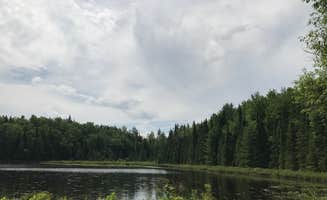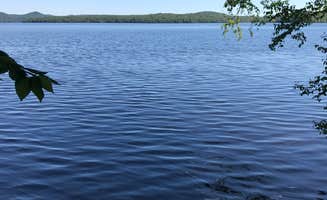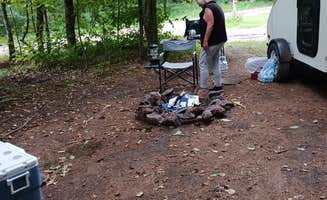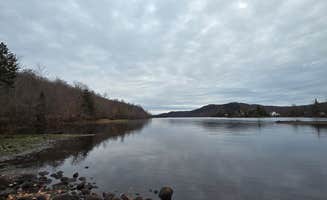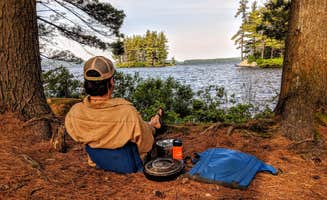Rustic camping near Lowville, New York offers primitive sites across varied terrain ranging from lakeside beaches to forested islands. The region sits within the western Adirondack foothills, characterized by numerous interconnected waterways and mixed hardwood forests at elevations between 1,200-1,800 feet. Winter temperatures frequently drop below zero, while summer evenings maintain cool conditions even after warm days.
What to do
Hiking to fire towers: Near Stillwater Reservoir, access the Stillwater fire tower trail for panoramic views of the surrounding wilderness. "This campsite is right down the road from the fire tower trail," notes Sam T., who stayed at one of the reservoir's rare car-accessible sites.
Paddling to island sites: Explore remote islands by canoe or kayak to find secluded camping spots. A camper at Cranberry Lake Backcountry Sites shared, "We spent 3 nights backcountry camping on Catamount Island in Cranberry Lake and absolutely loved it! The sunsets from the island were truly incredible."
Wildlife viewing: Watch for native species during early morning hours. "We saw Bald Eagles and Loons, enjoyed swimming, canoeing and paddleboarding with the family," reports Christie M. about their family gathering at Stillwater Reservoir.
What campers like
Waterfront access: Many sites feature direct lake access for swimming and fishing. According to a visitor at Blue Lagoon Primitive Dispersed Camping, "A short hike in to a great beach for swimming or paddling. We've stayed here many times in tents and hammock tents."
Seclusion and space: Sites typically accommodate multiple tents with substantial privacy between neighboring campers. One Stillwater Reservoir visitor reported, "Our site #37 accommodating 20 members of the family plus 3 dogs!" demonstrating the generous sizing of some waterfront locations.
Sand beaches: Several sites feature natural sand beaches uncommon in mountain settings. Elizabeth B. noted about Stillwater: "The season had had unusually low water all over and it left a really unusual landscape on the beach to explore."
What you should know
Access limitations: Most prime sites require watercraft to reach. "My wife and I kayaked to Long Island and stayed for a weekend. It was quiet and had the whole island to our self," reports a visitor to Stillwater Reservoir.
Navigation challenges: Unmarked routes and limited signage can make finding sites difficult. At North Lake Reservoir Campground, a camper advises, "Make sure to take a left at the start of the lake, the right is all private road and you will have to turn around."
Primitive facilities: Expect minimal or no facilities at most sites. At Payne Lake, a visitor reported, "Public access boat ramp with limited parking available on both sides. No amenities on-site."
Digital detox required: Cell coverage is extremely limited. "Would recommend if you want to break away from technology because you get zero service out there," notes Sam T. about kayaking to Long Island at Stillwater.
Tips for camping with families
Choose accessible sites: For families with young children, consider sites with drive-up access. One visitor to Winona State Forest noted the site was "just feet off of Bargy Road" making it convenient for unloading family gear.
Pack extra clothes: Temperature swings can be significant, with warm days followed by cold nights. At Stillwater Reservoir, a camper reported, "Even in cold rainy weather we had a phenomenal time," highlighting the need for appropriate layers.
Short hike options: Some sites offer manageable walking distances suitable for children. Elizabeth B. described Sunday Lake as having a "trail [that] is 0.3 miles To Sunday lake" with "Space to park two cars or a small RV off the road."
Tips from RVers
Limited RV sites: Very few dispersed sites accommodate RVs, with most requiring tents. A visitor to Seventh Lake Primitive Camping noted, "There are a few camping sites and one lean-to that I know of in this area," but access is primarily by water.
Parking constraints: Even car-camping locations have restricted parking areas. At Towsley Road Dispersed Camping, Noah D. advised, "When you get to the destination you have to go a little more up the road until you see a sign and a sand patch on the side of the road."
Rough access roads: Unpaved forest roads can be challenging for larger vehicles. A visitor to Stillwater mentioned "a 20 mile ride of just woods on a bumpy road" to reach the reservoir, indicating potential difficulty for larger rigs.


